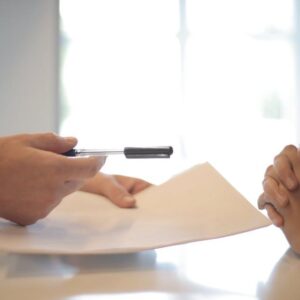Opening a personal bank account sounds straightforward, right? You fill out some forms, deposit money, and you’re good to go. But let’s pause for a second—are you sure you’re making the right decisions for your needs? Choosing the right bank and account type isn’t something to rush through. The choices you make now can save you time, money, and a lot of headaches down the line.
Contents
- 1 Why Your Bank Choice Matters
- 2 Types of Personal Bank Accounts to Consider
- 3 What Documents Do You Need to Open an Account?
- 4 The Importance of Account Fees (and How to Avoid Them)
- 5 Interest Rates: Are They Worth It?
- 6 Digital Banking Features: Must-Haves in Today’s World
- 7 What Happens After You Open the Account?
- 8 Taking the First Step with Confidence
Why Your Bank Choice Matters
Not all banks are the same, and the one you choose can make a big difference in how convenient and cost-effective your banking experience will be. A reputable and reliable bank like Crossroads Bank truly does make all of the difference. Think about how often you’ll visit a branch. Is physical access important, or do you prefer managing everything online?
Some banks are great for tech-savvy customers who never need to step foot inside, while others focus on personalized service in-branch. Then there are fees—no one likes surprises, so take time to understand the charges for things like ATM withdrawals, monthly maintenance, or overdrafts.
Ask yourself: What’s more important—accessibility, low fees, or cutting-edge digital tools? Prioritizing your needs can help you pick the right institution.
Types of Personal Bank Accounts to Consider
Here’s where the real decision-making starts: What kind of account do you need? The most common types are checking accounts and savings accounts, but they serve very different purposes.
- Checking accounts are best for everyday transactions, like paying bills, making purchases, or withdrawing cash. They typically come with a debit card and offer features like online banking and direct deposit.
- Savings accounts are ideal for stashing money you don’t need immediate access to. They usually offer interest on your balance, though rates can vary. Savings accounts are great if you want to build an emergency fund or save for a specific goal.
For many people, having both makes sense. You use your checking account for day-to-day expenses while letting your savings account quietly grow in the background. Need something more specialized? Some banks also offer joint accounts for shared expenses or student accounts with perks like waived fees. Thinking ahead about how you’ll use the account will steer you in the right direction.
What Documents Do You Need to Open an Account?
Let’s talk paperwork. Banks have strict rules to ensure your identity is legitimate, so be prepared with a few key documents. Typically, you’ll need:
- Proof of identity – A government-issued ID like a driver’s license or passport.
- Proof of address – This could be a utility bill, lease agreement, or another official document showing your current residence.
- Social Security Number or Tax ID – For tracking purposes and to meet federal requirements.
- Initial deposit – Many banks require a minimum deposit to open an account. Double-check this ahead of time so you’re not caught off guard.
Having these documents ready will make the process much smoother. No one likes scrambling at the last minute to find paperwork!
The Importance of Account Fees (and How to Avoid Them)
Let’s face it—fees can really eat into your balance if you’re not careful. While some accounts offer free banking, others may come with charges for services you didn’t even know you were using. That’s why it’s so important to review the fine print.
Here are a few common fees to watch for:
- Monthly maintenance fees – Some accounts charge you just to keep them open. Many banks waive these if you meet certain criteria, like maintaining a minimum balance or setting up direct deposit.
- Overdraft fees – If you spend more than what’s in your account, you could face hefty charges. Some banks offer overdraft protection, but it’s not always free.
- ATM fees – Using an out-of-network ATM can result in fees from both your bank and the ATM operator.
- Paper statement fees – Many banks now charge for mailed statements, encouraging you to go paperless.
The good news? Many of these fees are avoidable. Research account options carefully, and don’t hesitate to ask questions about fee waivers or alternatives.
Interest Rates: Are They Worth It?
If you’re opening a savings account, you’ll want to pay attention to interest rates. While most traditional savings accounts don’t offer jaw-dropping returns, every little bit helps when you’re growing your balance.
Some banks offer tiered rates, meaning the more you save, the higher the interest you’ll earn. Others focus on offering competitive rates for all balances. Before you get too excited, check whether there are any conditions for earning the advertised rate—like maintaining a certain balance or avoiding withdrawals.
Digital Banking Features: Must-Haves in Today’s World
Let’s be real: most of us handle banking on our phones these days. That’s why it’s crucial to choose an account with user-friendly digital tools. Here are a few features worth considering:
- Mobile app quality – Does the app let you easily check balances, transfer money, and deposit checks? Look for apps with high ratings and plenty of features.
- Alerts and notifications – Many banks allow you to set up alerts for low balances, unusual transactions, or upcoming bill payments. These are lifesavers for staying on top of your finances.
- Online bill pay – Simplify your life by paying all your bills through one platform.
- Budgeting tools – Some banks include spending trackers or savings goal features in their apps.
You don’t need all the bells and whistles, but having a few key tools can make managing your account more convenient.
What Happens After You Open the Account?
Once your account is set up, you’re not done just yet. Take time to explore all the features and tools your bank offers. Set up online access right away, activate any debit cards, and arrange for direct deposit if you’re planning to use it.
It’s also a good idea to download your bank’s app and play around with it—check how easy it is to navigate and ensure you know how to transfer funds or pay bills. This little bit of extra effort now can save you time later.
Taking the First Step with Confidence
Opening a personal bank account might seem like a small task, but it’s an important one. By understanding your needs, doing your research, and preparing in advance, you’ll set yourself up for a smooth experience.
Whether it’s avoiding fees, finding the right tools, or choosing a bank that aligns with your lifestyle, a bit of planning goes a long way. Now, you’re ready to take the plunge—start exploring your options and feel confident about managing your finances your way!





